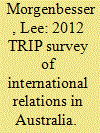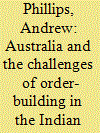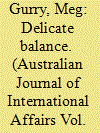|
|
|
Sort Order |
|
|
|
Items / Page
|
|
|
|
|
|
|
| Srl | Item |
| 1 |
ID:
119080


|
|
|
|
|
| Publication |
2013.
|
| Summary/Abstract |
This article analyses the results of the most recent and largest cross-national survey on the international relations discipline. Completed by scholars in 20 countries, the survey covered the areas of teaching, research, foreign policy, the profession, and the relationship between policy and academia. From an Australian perspective, the key findings include the strong link between what academics teach and research; the narrowing epistemological gap between the USA and Australia; the curious pessimism of scholars on a wide range of foreign policy issues; and the ability of scholars to define research quality independently of other national settings. The most significant and alarming finding, however, concerned how the present structure of the field is undermining scholars'attempt to forge closer, more influential ties with policy makers in Canberra. In fact, it is clear from the results that what academics research and how they go about it is actually counterintuitive to this goal. The article concludes with three recommendations aimed at rectifying this problem.
|
|
|
|
|
|
|
|
|
|
|
|
|
|
|
|
| 2 |
ID:
119073


|
|
|
|
|
| Publication |
2013.
|
| Summary/Abstract |
This article considers the regional order-building challenges that Australia presently confronts in the Indian Ocean region (IOR). The author argues that while regional stability within the IOR constitutes an increasingly important Australian security interest, policy makers will struggle to translate the order-building strategies they have previously pursued in East Asia into an Indian Ocean context. In East Asia, Australia has historically pursued a 'dual track' order-building strategy centred on its participation in a US-dominated 'hub and spokes' alliance system alongside multilateral regional engagement. The absence of an equivalent alliance system or an established tradition of multilateral security diplomacy conversely precludes an extension of this strategy into the IOR. Growing tensions between the USA and China and between China and India, meanwhile, further complicate IOR security dynamics, while underscoring the urgent need for a more coherent approach to regional order-building. With these challenges in mind, the author concludes by proposing a range of bilateral, minilateral and multilateral initiatives that Australia should pursue to stimulate the emergence of a more cooperative IOR security environment.
|
|
|
|
|
|
|
|
|
|
|
|
|
|
|
|
| 3 |
ID:
119077


|
|
|
|
|
| Publication |
2013.
|
| Summary/Abstract |
As the USA and Russia seek to reduce their nuclear arsenals en route to universal disarmament, they are hamstrung by the lack of a doctrinal basis for minimum deterrence. The cold war debate between Albert Wohlstetter and Patrick Blackett remains valid today. Though Wohlstetter's ideas, which produced large arsenals, remain influential, an examination of the history of nuclear rivalries shows that Blackett's thinking-offering security with more compact arsenals-is closer to reality. The minimalist doctrines and practices of China, India and, to a lesser extent, Pakistan offer useful lessons for the USA and Russia. But the Asian powers themselves need to iron out the inconsistencies in their thinking, which harbours elements of Wohlstetter's thought, if they are to be truly useful models that the bigger powers can emulate.
|
|
|
|
|
|
|
|
|
|
|
|
|
|
|
|
| 4 |
ID:
119075


|
|
|
|
|
| Publication |
2013.
|
| Summary/Abstract |
The Australia-India relationship has pivoted on more than the sale of uranium, and is not purely a narrative of neglect. While there have been some periods where bilateral relations received inadequate attention, the years 1947 to 1980 tell of a more complex story. During this time, many Australian diplomats and leaders worked hard to include India in Australia's foreign policy calculations. However, it proved difficult, arguably impossible, to negotiate a path for the Australia-India connection through the complexities of the India-Pakistan relationship and the strategic uncertainties of this most fragile of regions. Indian leaders, not without cause, constantly accused Australia of a 'tilt' to Pakistan. An examination of the Australian archives for this period reveals the inhibiting effects of the India-Pakistan conflict, particularly over Kashmir, on the development of a more fruitful Australia-India collaboration.
|
|
|
|
|
|
|
|
|
|
|
|
|
|
|
|
| 5 |
ID:
119079


|
|
|
|
|
| Publication |
2013.
|
| Summary/Abstract |
The US-Republic of Korea (ROK) alliance had significantly developed asset specificities and common social identities attached to it during the cold war period. If institutional features and ideational factors originating from the cold war threat can account for alliance resilience in the post-cold war period, the US-ROK alliance should be a 'most likely case' to support those causal links. This article shows that such is not the case. This article, instead, argues that the US-ROK alliance went beyond being an instrument of threat response to becoming a more complicated mechanism for serving 'general interests' in relation to North-East Asian regional order maintenance and order-building, which drove the US-ROK alliance between 1998 and 2008.
|
|
|
|
|
|
|
|
|
|
|
|
|
|
|
|
| 6 |
ID:
119078


|
|
|
|
|
| Publication |
2013.
|
| Summary/Abstract |
For two decades, Myanmar sat at the top of the international human rights agenda. With recent political changes, this may now be a thing of the past, but the bad old days hold important lessons that should not be forgotten. This article draws on interviews conducted mainly inside Myanmar over a period of 15 years to evaluate, contrast and compare the impact of different international human rights policies on the ground. It is argued that while the effects of both Western ostracism and regional business as usual have been largely counterproductive and often harmful to the Myanmar people, principled engagement by the United Nations and other international organisations has shown significant potential to help promote human rights. This is a lesson which may be worth heeding in other repressive states.
|
|
|
|
|
|
|
|
|
|
|
|
|
|
|
|
| 7 |
ID:
119076


|
|
|
|
|
| Publication |
2013.
|
| Summary/Abstract |
This article focuses on the dominant and parallel struggles that have been carried out in Pakistan in terms of its Islamic identity since 9/11. It argues that the Pakistan government has legitimised and explained its partnership with the US government in countering terrorism through a discourse that makes use of Islamic symbols. The Islamists have engaged in a similar process, arguing for jihad against the enemies of Islam. Simultaneously, a tension has persisted between liberal/progressive and orthodox notions of being a Pakistani Muslim, which has been reflected in, for example, the debate on the blasphemy law in Pakistan. It is important that strategies to strengthen Pakistan also creatively empower groups subscribing to liberal/progressive ideas so as to succeed in the struggle against militancy in the long term. The argument is developed in three parts, starting with a discussion of opposing views on Pakistan's identity and the place of Islam as the context for the Pakistan government's participation in the War on Terror. The second part explores features of the opposing discourses adopted by Islamabad and jihadi groups. The third part discusses the parallel tensions between alternative understandings of Pakistan's Islamic identity at the societal level with reference to the blasphemy law. The concluding section suggests a carefully crafted approach to assisting Pakistan at this stage in its history that could also respond to the subordinate tensions.
|
|
|
|
|
|
|
|
|
|
|
|
|
|
|
|
|
|
|
|
|